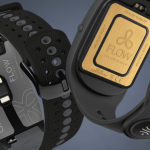


The FLOW™ technology is a complex of sensors, physiological and mathematical models used by GoBe smart bands to deliver data on calorie intake and water balance. This tech is fully developed inside the HEALBE company and patented around the globe.
HEALBE GoBe smart band constantly tracks water dynamics in tissues with a high-precision impedance sensor to detect patterns related to the osmolarity of ingested nutrients.
Thus, GoBe registers calories exactly when they are absorbed from the blood.
Keep in mind that stages of the digestion process take some time, and it may vary depending on food composition and preparation:
• 1-5 minutes – the process of chewing and swallowing;
• 2-4 hours – the handling of food by digestive fluids in the stomach;
• 3-5 hours – absorption in the small intestine;
• 10 hours to several days – absorption and dehydration in the colon.
Keep in mind that stages of the digestion process take some time, and it may vary depending on food composition and preparation:
• 1-5 minutes – the process of chewing and swallowing;
• 2-4 hours – the handling of food by digestive fluids in the stomach;
• 3-5 hours – absorption in the small intestine;
• 10 hours to several days – absorption and dehydration in the colon.
As a responsible consumer technology developer, HEALBE company conducted two independent validation studies in UC Davis and Guangzhou Red Cross Hospital.
The average value of relative percentage error(%RD) over the two-week period for these two studies was 11%(9% at UC Davis and 12.55% at Guangzhou). In other words, the average accuracy has reached the average value of 89%.
Calorie intake
By the end of 2018, the Foods for Health Institute at the University of California Davis has completed a validation study of the HEALBE GoBe2 Smart band. A 14-day study was conducted on 27 adult volunteers between the ages 18-40 years old, 11 men and 16 women. The results of the study confirm the accuracy of GoBe2 in the automatic tracking of digested calories.
Calorie counting accuracy was assessed by comparing data from the manually recorded food diaries and the data from the GoBe2. Study meals were prepared in a UC Davis commercial kitchen by trained food service personnel following a stringent HACCP protocol. A research team analyzed the calorie content of each individual menu item. They weighed, recorded, portioned, and served the food and recorded plate waste for all study volunteers at each meal served in the dining facility. To determine how well the device and its algorithms estimated the actual diet of volunteers, the correlation between recorded intake and data from the GoBe2 was examined.
Data were transformed into three-day rolling averages, and the GoBe2 accuracy was 90%(RD 10%). Over the two-week period, the GoBe2 showed an accuracy of 91%(9% RD) in measuring calorie intake.
The ability of the HEALBE GoBe2 to accurately track calorie digestion significantly differentiates it from other wearable health-monitoring smart bands. The level of accuracy exceeds the effectiveness of comparable devices or methods which rely on a human recording of diet and calorie ingestion, as the potential for human error in such methods puts accuracy too low.
More information on the study can be found here
Hydration
In December 2018, the Foods for Health Institute UC Davis (California, USA) has conducted studies to test the accuracy of GoBe2 ™ hydration module. Hydration level was measured for 11 volunteers (9 females and 2 males) after exercise against a hydration level observed after drinking. The experiments proved the ability of the device to detect hydration level change – both during rehydration and dehydration – with high accuracy.
More information on the study can be found here
Calorie intake
In October-December 2018 Guangzhou Red Cross Hospital (Guangzhou, China) has conducted pilot studies to test the accuracy of calorie intake and hydration measurements by the GoBe2 smart band for the Asia region.
The study compared the calorie intake accuracy between GoBe2™ measurements and manual tracking methods such as food diaries. Food and nutrient intake were measured for 13 healthy volunteers (3 men, 10 women) over 28 days. The received data was grouped in 3-day intervals to evaluate an average calorie intake per day.
The average calorie intake rate by GoBe2™ differed from the reference method by about 250 Kcal/day in average. When compared for all the study periods, the day-by-day energy intake data provided by GoBe2™ technology had a good consistency with daily energy intake provided by food diary records, and the relative difference between these two methods was consistent ~12% only.
The study concludes that GoBe2™ ’s calorie intake measurements correlate well enough with the data by the direct observation method and that the GoBe2™ wristband can be a good device for people to monitor their food energy intake.
More information on the study can be found here
Hydration
The hydration module was tested within the same audience. The test has proven the ability of GoBe2™ to evaluate both dehydration after moderate physical activity (like walking and jogging) and rehydration after water drinking for individuals..
More information on the study can be found here
Calorie burn
Between October and December 2018, the Red Cross Hospital (in Guangzhou, China) also validated the GoBe2 ability to track energy expenditure (or calorie burn) accurately.
The energy expenditure tests were performed on 13 healthy volunteers between the ages of 20 and 50 years. Each completed two test sessions. Tests included typical physical activities (sedentary state, walking, and running). The study confirmed the GoBe2’s high level of accuracy related to energy expenditure (or calorie burn) estimations during a treadmill activity and routine activity measurements.
Comparison with other devices: the validation study results were compared with the data from the published scientific study (Bai 2016*). The study confirmed the high level of accuracy of the GoBe2 device, compared to its competitors.
More information on the study can be found here